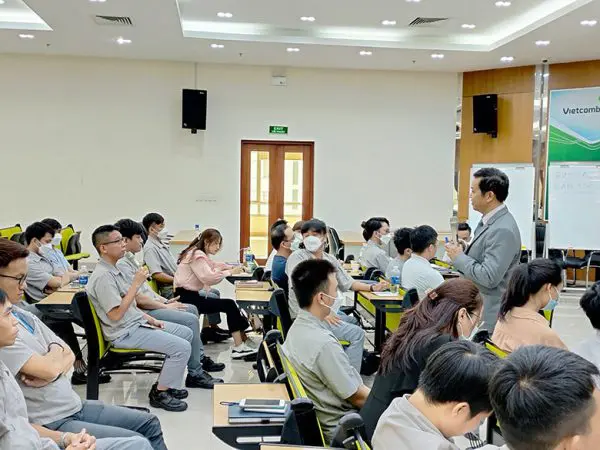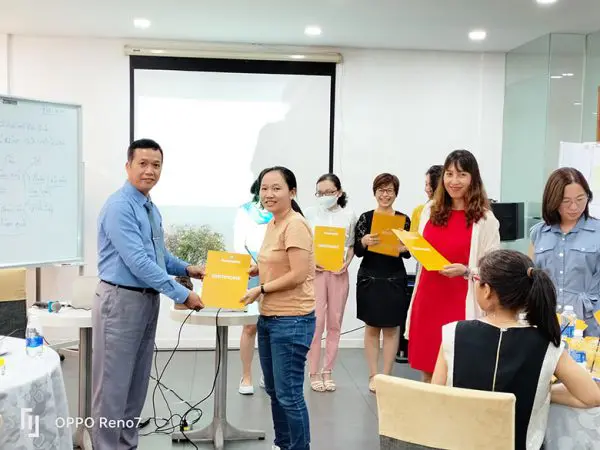|
|
Bộ Công Cụ Quản Trị Chất Lượng Lean Six Sigma
(Lean Six Sigma Quality Management Toolkits)

1. Giới thiệu bộ toolkits:
Bộ công cụ "Quản Trị Chất Lượng Lean Six Sigma (Lean Six Sigma Quality
Management Toolkits)" được thiết kế nhằm giúp doanh nghiệp triển khai hiệu quả
hệ thống quản lý chất lượng dựa trên phương pháp Lean Six Sigma. Bộ toolkits này
cung cấp các biểu mẫu và công cụ thực hành chuẩn hóa giúp loại bỏ lãng phí, giảm
sai lỗi, cải thiện năng suất và nâng cao giá trị cho khách hàng.
Bộ công cụ được xây dựng theo chu trình DMAIC (Define – Measure – Analyze –
Improve – Control), phù hợp với các doanh nghiệp có quy mô lớn, nhiều cấp quản
lý, và hoạt động trong môi trường sản xuất hoặc dịch vụ cần tối ưu hóa chất
lượng liên tục.
2. Đối tượng sử dụng:
- Ban lãnh đạo doanh nghiệp, giám đốc sản xuất, giám đốc chất lượng, giám đốc
vận hành.
- Trưởng nhóm Lean Six Sigma, Green Belt, Black Belt, và chuyên viên cải tiến
quy trình.
- Trưởng phòng kế hoạch, sản xuất, bảo trì, nhân sự, và quản lý nhà máy.
- Các nhóm dự án cải tiến chất lượng, đội ngũ nhân viên Kaizen hoặc 5S.
- Giảng viên nội bộ, chuyên gia đào tạo và tư vấn Lean Six Sigma trong doanh
nghiệp.
3. Nội dung bộ toolkits:
Part 1. Lean Six Sigma Strategy & Framework
Objective: To define the organizational framework, goals, and governance for
implementing Lean Six Sigma initiatives.
1. LSS-0101_Lean_Six_Sigma_Strategy_Framework.docx
2. LSS-0102_Quality_Management_Policy.docx
3. LSS-0103_Lean_Six_Sigma_Roles_and_Responsibilities_Matrix.xlsx
4. LSS-0104_Process_Improvement_Objectives.docx
5. LSS-0105_LSS_Communication_and_Training_Plan.docx
6. LSS-0106_Project_Prioritization_and_Selection_Sheet.xlsx
7. LSS-0107_Annual_Quality_Improvement_Plan.xlsx
Part 2. Define Phase – Problem Definition & Project Charter
Objective: To clearly define project goals, scope, stakeholders, and
measurable outcomes aligned with business priorities.
1. LSS-0201_Project_Charter_Template.docx
2. LSS-0202_Problem_Statement_Form.docx
3. LSS-0203_Voice_of_Customer_Analysis.xlsx
4. LSS-0204_Stakeholder_Analysis_Sheet.xlsx
5. LSS-0205_Process_Scope_Diagram.docx
6. LSS-0206_Project_Risk_Assessment_Form.docx
7. LSS-0207_SIPOC_Diagram_Template.xlsx
Part 3. Measure Phase – Data Collection & Baseline Analysis
Objective: To collect relevant process data, measure performance baselines,
and quantify the current state of quality performance.
1. LSS-0301_Data_Collection_Plan_Template.docx
2. LSS-0302_Process_Mapping_Worksheet.xlsx
3. LSS-0303_Measurement_System_Analysis_Sheet.xlsx
4. LSS-0304_Process_Capability_Analysis_Tool.xlsx
5. LSS-0305_Defect_Log_and_Pareto_Analysis.xlsx
6. LSS-0306_Time_and_Motion_Study_Form.docx
7. LSS-0307_Baseline_Performance_Report.docx
Part 4. Analyze Phase – Root Cause & Statistical Analysis
Objective: To identify root causes of process variation using analytical
tools, statistical testing, and Lean methods.
1. LSS-0401_Root_Cause_Analysis_Form.docx
2. LSS-0402_Fishbone_Diagram_Template.xlsx
3. LSS-0403_5Whys_Analysis_Sheet.xlsx
4. LSS-0404_Regression_and_Correlation_Analysis.xlsx
5. LSS-0405_Statistical_Hypothesis_Testing_Tool.xlsx
6. LSS-0406_Process_Variation_Chart.xlsx
7. LSS-0407_Findings_and_Insight_Report.docx
Part 5. Improve Phase – Solution Design & Implementation
Objective: To develop, test, and implement improvement solutions addressing
root causes and eliminating waste.
1. LSS-0501_Improvement_Idea_Log.xlsx
2. LSS-0502_Kaizen_Event_Planning_Form.docx
3. LSS-0503_Process_Redesign_Template.docx
4. LSS-0504_Improvement_Action_Plan.xlsx
5. LSS-0505_Pilot_Test_Result_Summary.xlsx
6. LSS-0506_Implementation_Approval_Form.docx
7. LSS-0507_Improvement_Impact_Analysis_Report.docx
Part 6. Control Phase – Monitoring & Sustaining Improvements
Objective: To ensure long-term sustainability of improvements through
monitoring, documentation, and control mechanisms.
1. LSS-0601_Control_Plan_Template.docx
2. LSS-0602_Process_Control_Chart.xlsx
3. LSS-0603_Preventive_Maintenance_Checklist.xlsx
4. LSS-0604_Standard_Work_Document.docx
5. LSS-0605_Process_Audit_Checklist.docx
6. LSS-0606_Performance_Monitoring_Dashboard.xlsx
7. LSS-0607_Control_Verification_Report.docx
Part 7. Lean Tools & Visual Management
Objective: To integrate Lean tools and visual systems for operational
efficiency, workplace organization, and waste elimination.
1. LSS-0701_5S_Audit_Checklist.xlsx
2. LSS-0702_Value_Stream_Mapping_Tool.xlsx
3. LSS-0703_Process_Flow_Visualization_Form.docx
4. LSS-0704_Kanban_Board_Template.xlsx
5. LSS-0705_Visual_Management_Guide.docx
6. LSS-0706_Production_Waste_Tracking_Sheet.xlsx
7. LSS-0707_Lean_Standard_Work_Template.docx
Part 8. Performance Review, Reporting & Recognition
Objective: To evaluate the effectiveness of Lean Six Sigma projects and
recognize team contributions to organizational success.
1. LSS-0801_Project_Review_Meeting_Minutes.docx
2. LSS-0802_Performance_Improvement_Summary_Report.xlsx
3. LSS-0803_Cost_Saving_Calculation_Sheet.xlsx
4. LSS-0804_Team_Performance_Evaluation_Form.docx
5. LSS-0805_Quality_Improvement_Award_Nomination_Form.docx
6. LSS-0806_Lessons_Learned_Report.docx
7. LSS-0807_Annual_Quality_Excellence_Report.docx
4. Nguyên tắc sử dụng:
- Các biểu mẫu được thiết kế bám sát chu trình DMAIC – là quy trình chuẩn trong
Lean Six Sigma.
- File .docx dùng cho biểu mẫu báo cáo, mô tả quy trình, biên bản, chính sách;
file .xlsx dùng cho các công cụ đo lường, thống kê và phân tích dữ liệu.
- Các nhóm cải tiến cần áp dụng đồng bộ từ Define đến Control để đảm bảo kết quả
cải tiến bền vững.
- Toàn bộ dữ liệu và biểu mẫu cần được lưu trữ tập trung nhằm phục vụ đánh giá
nội bộ và tái chứng nhận.
5. Hướng dẫn triển khai trong doanh nghiệp:
- Bước 1: Xây dựng chiến lược và kế hoạch triển khai Lean Six Sigma (Part 1).
- Bước 2: Lựa chọn dự án cải tiến, xác định phạm vi và mục tiêu (Part 2).
- Bước 3: Thu thập dữ liệu, đo lường thực trạng và đánh giá năng lực quy trình
(Part 3).
- Bước 4: Phân tích nguyên nhân gốc rễ và đề xuất giải pháp cải tiến (Part 4–5).
- Bước 5: Kiểm soát, duy trì kết quả cải tiến và chuẩn hóa quy trình (Part 6).
- Bước 6: Đánh giá hiệu quả, ghi nhận kết quả và lan tỏa văn hóa Lean Six Sigma
(Part 7–8).
6. Kết quả mong đợi sau áp dụng:
- Giảm sai lỗi, lãng phí và thời gian chu trình sản xuất.
- Nâng cao năng suất, chất lượng và hiệu quả chi phí.
- Phát triển năng lực phân tích, tư duy dữ liệu và kỹ năng cải tiến của đội ngũ.
- Hình thành văn hóa chất lượng và cải tiến liên tục trong doanh nghiệp.
- Tăng sự hài lòng của khách hàng và năng lực cạnh tranh bền vững của tổ chức.

 Translate
Translate











